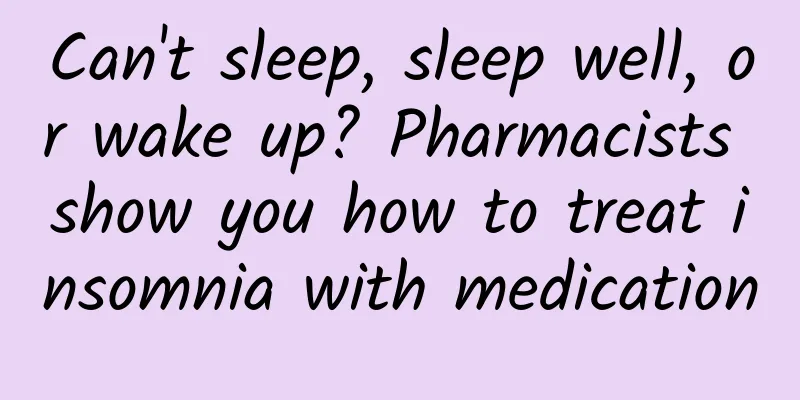Can't sleep, sleep well, or wake up? Pharmacists show you how to treat insomnia with medication

|
Sleep is an important part of human life. About one-third of a person's life is spent in sleep. When the human body enters the sleep state, a large number of life activities begin, such as the regulation of the immune system and brain function, the maintenance of energy metabolism, and the removal of metabolites [1]. Therefore, it is very important to be able to sleep, sleep well, and wake up properly. Insomnia is the most common type of sleep disorder [2]. In recent years, with the rapid development of society, the accelerated pace of life, and the enrichment of nightlife, people's sleep time has been continuously shortened, and insomnia has become quite common. According to the "2018 China Sleep Quality Survey Report", currently about 84% of adults in my country have suffered from or are suffering from sleep problems, among which 16% of adults sleep less than 6 hours a night [3]. Sleep is the most basic physiological need of human beings, and it is of great significance to people's physical and mental health and social functions [4]. Therefore, it is crucial to maintain and preserve this one-third of life. 1. Definition of Insomnia Disorder Insomnia disorder, also known as insomnia or sleep initiation and maintenance disorder, is characterized by frequent and persistent difficulty falling asleep or maintaining sleep, which leads to low sleep satisfaction[5]. Its main clinical classification is chronic insomnia disorder (course ≥ 3 months), short-term insomnia disorder (course < 3 months) and other insomnia disorders[6]. Insomnia disorder can be caused by a combination of multiple factors. When patients suffer from short-term insomnia disorder, the corresponding inducing factors can often be found. After removing the inducing factors, most patients can restore normal sleep, but some patients will still develop chronic insomnia disorder. Insomnia disorder can significantly reduce the patient's quality of life and can cause a variety of mental disorders such as alcohol and drug abuse, cognitive impairment and Alzheimer's disease, depression and anxiety, and even increase the patient's risk of suicide[7]. In addition, insomnia disorder is also a risk factor for a variety of physical diseases such as hypertension, diabetes, cardiovascular disease, stroke, chronic pain, colds, chronic inflammation, etc.[8, 9]. 2. Common causes of insomnia: ① Acute stress: mainly transient excitement, mental tension, recent bereavement, changes in sleeping environment, jet lag, etc.; ② Drug use: Stimulant drugs can cause insomnia, such as caffeine, theophylline, thyroxine, cocaine, corticosteroids and anti-Parkinson's disease drugs; the withdrawal reaction of certain drugs can cause rebound insomnia. ③Age: The incidence of insomnia disorders increases with age[10]; ④ Gender: Women are more likely to suffer from insomnia than men, with a prevalence rate of about 1.41 times that of men, which may be related to the fact that women have more special physiological periods [11]; ⑤ Mental disorders: Hyperactive manic patients may sleep less or even no sleep, depressed patients tend to wake up early, and positive symptoms of schizophrenia patients may induce insomnia; ⑥ Physical disease: The incidence of insomnia in patients with internal medical diseases is significantly higher than that in ordinary people. In addition, the incidence of internal medical diseases in patients with insomnia is significantly higher than that in non-insomniacs [12]. 3. Drug treatment for insomnia Drug treatment for insomnia should follow the principle of on-demand, adequate, and brief treatment. The drug should be started with the lowest effective dose, and the drug dose should not be easily adjusted after the effective dose is reached. Intermittent administration can be adopted, such as 3-5 days of medication per week, to establish a normal sleep rhythm. When the medication is used for more than 6 months or the condition fluctuates, the sleep state should be fully evaluated, and the medication regimen can be adjusted if necessary. Currently, the commonly used drugs for the treatment of insomnia disorders include: benzodiazepine receptor agonists: such as zolpidem, zopiclone, zaleplon, estazolam, lorazepam, etc.; melatonin receptor agonists [13]: ramucirumab; antidepressants with sedative and hypnotic effects: mirtazapine, fluvoxamine, etc., which are suitable for insomnia patients who also suffer from affective disorders and neurosis. Some anti-epileptic drugs (diazepam, phenobarbital, etc.) and antipsychotic drugs (clozapine, olanzapine, etc.) also have sedative and hypnotic effects, which are only suitable for insomnia patients with corresponding diseases. In addition, orexin receptor antagonists such as belusomnia and lebrexan have been launched in the United States and Japan, which may be a new development direction for the treatment of insomnia disorders [14]. 4. Traditional Chinese medicine treatment of insomnia: According to TCM syndrome differentiation and treatment, the main location of insomnia is the heart, brain and internal organs, and the main causes are disturbed mind, malnutrition of brain and restlessness of mind. Insomnia can be divided into deficiency and excess. Deficiency syndrome is mostly caused by insufficient yin and blood and malnutrition of the heart. You can choose symptomatic deficiency-tonifying treatment such as Renshen Guipi Pills, Anshen Dingzhi Pills, Jiaotai Pills, Tianwang Buxin Pills, Baizi Yangxin Pills, and Zaoren Anshen Liquid; excess syndrome is mostly caused by excessive heat disturbing the heart and disturbing the mind. You can choose symptomatic heat-clearing treatment such as Longdan Xiexin Decoction, Baohe Pills, Xuefu Zhuyu Capsules, and Zhusha Anshen Pills. In addition, you can also choose auxiliary treatments such as acupuncture, moxibustion, massage, scraping, and magnetic therapy. 5. Comprehensive treatment of insomnia disorders: The treatment of insomnia disorder cannot rely solely on sedative hypnotic drugs, but requires joint efforts and close cooperation between doctors and patients to adopt a comprehensive treatment method to improve the treatment effect and reduce the occurrence of adverse drug reactions. In the case of short-term insomnia disorder, cognitive therapy, behavioral therapy and other methods can be adopted to help patients overcome anxiety and restore normal sleep by enhancing their cognition of sleep and sleep rhythm, thereby reducing the conversion rate to chronic insomnia disorder. Physical therapy is an auxiliary treatment method, mainly including light therapy, biofeedback therapy, repetitive transcranial magnetic stimulation, etc. [15]. When a single therapy is ineffective, a comprehensive treatment plan can be adopted with cognitive, behavioral therapy or physical therapy combined with insomnia disorder treatment drugs or Chinese patent medicines. In summary, sleep is an important part of human life activities and the basis for ensuring physical and mental health and maintaining social functions. With the progress of society, the incidence of insomnia disorders is getting higher and higher. How to treat insomnia disorders and maintain normal sleep for patients is very important. Currently, commonly used drugs for the treatment of insomnia disorders include benzodiazepine receptor agonists, melatonin receptor agonists, etc., and traditional Chinese medicine plays an increasingly important role in the treatment of insomnia disorders. When a single therapy is ineffective, a comprehensive treatment plan should be adopted to ensure that patients can sleep, sleep well, and wake up! References: [1] Liu Xuan, Zhang Xuan, Xue Rong. Research progress on the impact of sleep disorders on physical diseases[J]. Chinese Journal of Clinicians, 2021, 49(06): 652-4. [2]Sateia MJ. International classification of sleep disorders-third edition: highlights and modifications [J]. Chest, 2014, 146(5): 1387-94. [3] Wang Xiaoqiu, Wu Wenzhong, Liu Chengyong, et al. Logistic regression analysis of influencing factors of insomnia based on TCM constitution[J]. Chinese Journal of Integrated Traditional and Western Medicine, 2020, 40(03): 304-8. [4]Morin CM, Benca R. Chronic insomnia [J]. Lancet, 2012, 379(9821): 1129-41. [5]Abbott SM, Reid KJ, Zee PC. Circadian Rhythm Sleep-Wake Disorders [J]. The Psychiatric clinics of North America, 2015, 38(4): 805-23. [6]Francesmonneris A, Pincus H, First M. Diagnostic and Statistical Manual of Mental Disorders: DSM-V [M]. Diagnostic and Statistical Manual of Mental Disorders: DSM-V, 2013. [7]Li L, Wu C, Gan Y, et al. Insomnia and the risk of depression: a meta-analysis of prospective cohort studies [J]. BMC psychiatry, 2016, 16(1): 375. [8]Porto F, Sakamoto YS, Salles C. Association between Obstructive Sleep Apnea and Myocardial Infarction: A Systematic Review [J]. Arquivos brasileiros de cardiologia, 2017, 108(4): 361-9. [9]Xue Rong, Chen Shuli, Zhang Xuan. Progress in clinical research on the relationship between chronic insomnia and physical diseases[J]. Medicine and Philosophy (B), 2017, 38(05): 13-7. [10]Chiu HF, Leung T, Lam LC, et al. Sleep problems in Chinese elderly in Hong Kong [J]. Sleep, 1999, 22(6): 717-26. [11]Zhang B, Wing YK. Sex differences in insomnia: a meta-analysis [J]. Sleep, 2006, 29(1): 85-93. [12] Gu Ping, He Jincai, Liu Yanjiao, et al. Guidelines for the diagnosis and treatment of insomnia disorders in China [A]. Chinese Sleep Research Society, Heilongjiang Society of Integrated Traditional Chinese and Western Medicine. Handbook of the First Annual Academic Conference of the Northeastern Sleep Working Committee of the Chinese Sleep Research Society and the Second Annual Academic Conference of the Sleep Branch of the Heilongjiang Society of Integrated Traditional Chinese and Western Medicine [C]. Chinese Sleep Research Society, Heilongjiang Society of Integrated Traditional Chinese and Western Medicine: Chinese Sleep Research Society, 2019: 10. [13]Emet M, Ozcan H, Ozel L, et al. A Review of Melatonin, Its Receptors and Drugs [J]. The Eurasian journal of medicine, 2016, 48(2): 135-41. [14] Rui Ming, Han Na. A brief history of research and development of modern sleeping pills[J]. Chinese Journal of Medicinal Chemistry, 2021, 31(06): 460-9. [15]van Maanen A, Meijer AM, van der Heijden KB, et al. The effects of light therapy on sleep problems: A systematic review and meta-analysis [J]. Sleep medicine reviews, 2016, 29: 52-62. |
<<: How come your butt has hemorrhoids?
Recommend
Back pain in late pregnancy
We all know that when pregnant women reach the th...
How to treat cervicitis
The occurrence of cervicitis is often due to post...
What causes itching on the outside of the vagina?
The itching symptoms on the outside of the vagina...
I have dysmenorrhea even though I don't have my period
Cold pain in the lower abdomen, cold limbs, fear ...
What is the disease of cauliflower-like private parts?
If a man or a woman has small bumps on his or her...
Headache during menstruation
Period is the most important physiological phenom...
Self-examination for lumps on both sides of the breast
Breast tenderness may occur during ovulation or b...
What are the benefits of wearing silver bracelets?
Female friends like to be beautiful, so they ofte...
Can I eat plums after a cesarean section?
Caesarean section is very harmful to girls' b...
There is a pimple under the female genitals that does not hurt
A woman's body changes differently at differe...
What to do if there is heavy uterine bleeding
As people's knowledge and awareness change, m...
What does it depend on whether you can have a natural birth?
When a woman learns that she is pregnant after ma...
What is nutritious for baby's breakfast? What is the best way for baby to eat breakfast?
We all know that breakfast is a very important me...
Where do egrets usually live? What kind of animal is an egret?
We often read the phrase "a line of egrets f...
What is a glucose tolerance test?
The glucose tolerance test (OGTT) is a glucose lo...









